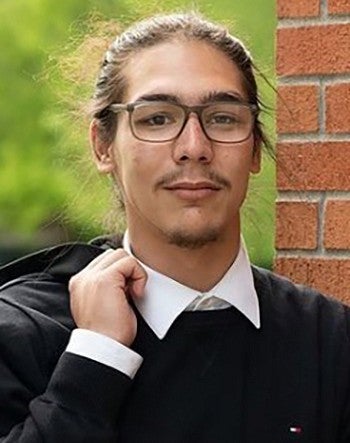Yazzie Chee remembers feeling “lost and alone” every day after he transferred to the University of Oregon from Lane Community College.
Chee says he struggled to find a social circle at the UO, felt nervous interacting with fellow students and faculty members, in part due to social anxiety he developed coming out of pandemic isolation.
“The transition was extremely hard,” he said. “Coming from an underprivileged household, I wasn’t given the right tools to navigate this institution.”
Then Chee took a chance on DucksRISE, a new grant-funded program that the Division of Undergraduate Education and Student Success launched spring erm 2022. The program assists first-generation and low-income students and students of color in building professional and research skills, developing connections for future careers, and forming community together.
Finding a community
Week after week, guest speakers, often from underrepresented backgrounds themselves, came to speak to the class about their experiences and career paths, and they highlighted a wide variety of opportunities and resources available to UO students. DucksRISE leaders held workshops on resume and cover letter writing and helped students with mock interviews.
Gradually, a tight-knit community formed in that first group, Chee said, which included social gatherings and celebrations of each other’s accomplishments.
Fast forward a year and Chee, a senior majoring in general social science, with a minor in Native American studies, has completed two internships through connections made at DucksRISE, at the Urban League in Portland and a Eugene-area law firm.
This spring, he will intern at the Civil Liberties Defense Center in Eugene, another step towards his goal, as a member of the Navajo Nation, to eventually study and practice Native American law.
“DucksRISE provided me tangible support, a group of people cheering me on,” Chee said. “That was very important to me.”
Helping students
The UO was one of just 15 institutions nationally to receive a $250,000 grant through the Strada Education Network’s Beyond Completion Challenge, which backed initiatives like DuckRISE that focused on promoting equitable students outcomes through and beyond college completion. Strada is a nonprofit organization that works create more equitable outcomes in higher education and forge clearer pathways between education and employment.
“The UO is committed to helping students find their way and to removing systemic obstacles from their paths, both in college and in preparing for the professional world,” said Kimberly Johnson, vice provost for undergraduate education and student success. “Through DucksRISE, we provide inclusive and structured support to help our students gain professional experiences, develop job seeking skills, and leverage the UO community for networking opportunities.”
DucksRISE was built as a six-month, cohort-based program for UO juniors and seniors. Students take a one-term course followed by a three-month experiential opportunity, usually an internship or research project. Applications are currently open for the spring 2023 class.
At first, the one-credit evening class felt a bit awkward, Chee said, but he quickly realized that many of fellow classmates were in the exact same boat as him.
The program partners with the UO’s Portland Internship Experience to help some students find placements, with an emphasis on businesses owned by people of color and equity and social justice-focused nonprofits. The Division of Undergraduate Education and Student Success provides research fellowship stipends and seed grants for DucksRISE participants to pursue research opportunities with UO faculty mentors.
“All components of the DucksRISE curriculum, professional development opportunities, networking, and community-building center on equity and inclusion,” said Feather Crawford, the program’s manager.
“Underrepresented students who lack a sense of belonging are often tentative to engage, and benefit from, direct outreach to help them overcome institutional barriers and take advantage of the services and opportunities available to them,” she said.
So far, the program has served 120 students in total; almost 65 percent of them are first-generation college students and 70 percent are Pell-grant eligible.
Finding research opportunities
Like Chee, Marissa Gonzalez-Ibarra came to the UO as a transfer student from East Los Angeles Community College. She too said she didn’t know what her place was at the UO or what she should be doing to prepare for life after college.
“I knew I needed to build up my resume, but I didn’t really know where to start,” she said. “I didn’t have the confidence to compete with kids that I knew came from good high schools or came here straight from high school.”
Gonzalez-Ibarra, a senior who is double majoring in psychology and sociology, was interested in research opportunities, but a research internship she secured on her own ended up not being very satisfying.
Through DucksRISE, she got to pursue research she was truly interested in. She received a research fellowship to study stress disparities in undergraduate students under the mentorship of UO psychology professor Elliott Berkman and two graduate employees.
During her months-long project, Gonzalez-Ibarra said she’s picked up data analysis and coding skills. She plans to present her findings at the Undergraduate Research Symposium this spring and hopes eventually to pursue a doctorate in clinical psychology.
DucksRISE staff also encouraged her to pursue her dream of study abroad, Gonzalez-Ibarra said, helping her successfully apply for two scholarships to help fund it. She’s going to London as part of Global Education Oregon’s spring psychology program, which will include an internship at a social services nonprofit for the elderly.
“The community I grew up in didn’t have a lot of good role models and that lack of direction really affected my self-worth and my sense of what I realistically could do in life,” she said. “At DucksRISE, I felt understood, I felt important, I felt connected. And I felt like every opportunity on campus was one that I could achieve.”
—By Saul Hubbard, University Communications




